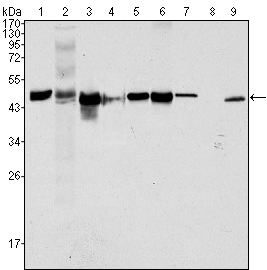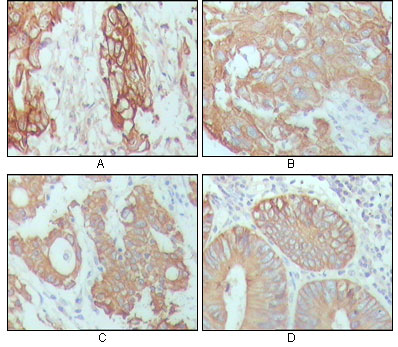Cytokeratin 18 Monoclonal Antibody
- Catalog No.:YM0182
- Applications:WB;IHC;IF;ELISA
- Reactivity:Human
- Target:
- Cytokeratin 18
- Fields:
- >>Estrogen signaling pathway;>>Staphylococcus aureus infection
- Gene Name:
- KRT18
- Protein Name:
- Keratin type I cytoskeletal 18
- Human Gene Id:
- 3875
- Human Swiss Prot No:
- P05783
- Mouse Swiss Prot No:
- P05784
- Immunogen:
- Purified recombinant fragment of human Cytokeratin 18 (aa391-483) expressed in E. Coli.
- Specificity:
- Cytokeratin 18 Monoclonal Antibody detects endogenous levels of Cytokeratin 18 protein.
- Formulation:
- Liquid in PBS containing 50% glycerol, 0.5% BSA and 0.02% sodium azide.
- Source:
- Monoclonal, Mouse
- Dilution:
- WB 1:500 - 1:2000. IHC 1:200 - 1:1000. ELISA: 1:10000.. IF 1:50-200
- Purification:
- Affinity purification
- Storage Stability:
- -15°C to -25°C/1 year(Do not lower than -25°C)
- Other Name:
- KRT18;CYK18;PIG46;Keratin; type I cytoskeletal 18;Cell proliferation-inducing gene 46 protein;Cytokeratin-18;CK-18;Keratin-18;K18
- Molecular Weight(Da):
- 48kD
- References:
- 1. Cancer Genet Cytogenet. 2007 Oct 15;178(2):94-103.
2. J Mol Histol. 2008 Apr;39(2):209-16.
- Background:
- KRT18 encodes the type I intermediate filament chain keratin 18. Keratin 18, together with its filament partner keratin 8, are perhaps the most commonly found members of the intermediate filament gene family. They are expressed in single layer epithelial tissues of the body. Mutations in this gene have been linked to cryptogenic cirrhosis. Two transcript variants encoding the same protein have been found for this gene. [provided by RefSeq, Jul 2008],
- Function:
- disease:Defects in KRT18 are a cause of cryptogenic cirrhosis [MIM:215600].,function:Involved in the uptake of thrombin-antithrombin complexes by hepatic cells (By similarity). When phosphorylated, plays a role in filament reorganization. Involved in the delivery of mutated CFTR to the plasma membrane. Together with KRT8, is involved in interleukin-6 (IL-6)-mediated barrier protection.,induction:By IL-6.,miscellaneous:There are two types of cytoskeletal and microfibrillar keratin: I (acidic; 40-55 kDa) and II (neutral to basic; 56-70 kDa).,PTM:O-glycosylated at multiple sites; glycans consist of single N-acetylglucosamine residues.,PTM:Phosphorylation at Ser-34 increases during mitosis. Hyperphosphorylated at Ser-53 in diseased cirrhosis liver. Phosphorylation increases by IL-6.,PTM:Proteolytically cleaved by caspases during epithelial cell apoptosis. Cleavage occurs at Asp-238 by either
- Subcellular Location:
- Cytoplasm, perinuclear region. Nucleus, nucleolus.
- Expression:
- Expressed in colon, placenta, liver and very weakly in exocervix. Increased expression observed in lymph nodes of breast carcinoma.
- June 19-2018
- WESTERN IMMUNOBLOTTING PROTOCOL
- June 19-2018
- IMMUNOHISTOCHEMISTRY-PARAFFIN PROTOCOL
- June 19-2018
- IMMUNOFLUORESCENCE PROTOCOL
- September 08-2020
- FLOW-CYTOMEYRT-PROTOCOL
- May 20-2022
- Cell-Based ELISA│解您多样本WB检测之困扰
- July 13-2018
- CELL-BASED-ELISA-PROTOCOL-FOR-ACETYL-PROTEIN
- July 13-2018
- CELL-BASED-ELISA-PROTOCOL-FOR-PHOSPHO-PROTEIN
- July 13-2018
- Antibody-FAQs
- Products Images

- Western Blot analysis using Cytokeratin 18 Monoclonal Antibody against HeLa (1), NIH/3T3 (2), A549 (3), Jurkat (4), MCF-7(5), HepG2 (6), A431 (7), HEK293 (8) and K562 (9) cell lysate.

- Immunohistochemistry analysis of paraffin-embedded human breast carcinoma (A), hepatocarcinoma (B), stomach cancer (C) and colon cancer tissue (D), showing cytoplasmic location with DAB staining using Cytokeratin 18 Monoclonal Antibody.



